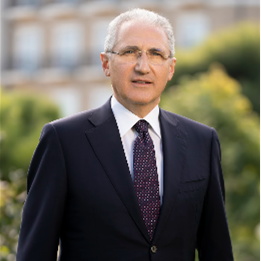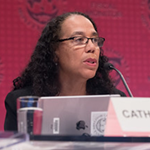Tuesday, Apr 22, 2025 | 01:00 PM - 02:00 PM
Location: Cedar Hall HQ1-1-660

EVENT SUMMARY
This panel discussion will explore how emerging and developing economies (EMDEs) can unlock financing for green investments, including in renewable energy, to foster inclusive growth and development. The content will draw on two recently published staff climate notes and successful country experiences, also emphasizing the role of the Fund in the context of the RSF. Many governments in EMDEs, although fiscally constrained, are increasingly developing innovative policy approaches to make their countries attractive investment destinations. Energy infrastructure is an important target sector for these investments and, in recent years, about 90 percent of new electricity capacity came from wind and solar energy. Beyond electricity infrastructure, countries are also seeking to take advantage of other emerging technologies, like electric vehicles and green hydrogen. In some of these technologies, emerging market economies with large potentials for wind and solar energy are at times better positioned than advanced economies. They could thus become prime destinations for foreign direct investments and develop these sectors with large potential to become growth and export engines. The session will discuss how countries can develop strategic partnerships and create policy frameworks to take advantage of these opportunities.
SPEAKERS

Rania Al-Mashat
Minister of Planning, Economic Development & International Cooperation, Egypt
H.E Dr. Rania A. Al-Mashat has been part of Egypt’s cabinet of ministers since 2018, where she currently serves as the Minister of Planning, Economic Development & International Cooperation, and has previously served as the Minister of International Cooperation (Dec 2019 - July 2024), and also as the first female Minister of Tourism (Jan 2018 - Dec 2019). She worked at the International Monetary Fund (IMF) in Washington, D.C. as Advisor to the Chief Economist (Aug 2016 - Jan 2018), and Senior Economist (2001 - 2005). She also served at the Central Bank of Egypt (CBE), as the Sub-Governor for Monetary Policy (Aug. 2005 - Jun. 2016), where she contributed to modernizing the CBE’s monetary policy strategy, underpinned by structural reforms to formally adopt an inflation-targeting regime, a key pillar of the banking sector reform program launched in 2004. Furthermore, she participated in the country’s macroeconomic management through the design and update of the macroeconomic framework in conjunction with other ministries and government entities and was the CBE’s liaison with the IMF and the Sovereign Rating Agencies.

Mukhtar Babayev
President of Azerbaijan's Special Representative for Climate Issues & COP29 President
Mukhtar Babayev is the President of Azerbaijan's Special Representative for Climate Issues. Prior to this appointment, Mukhtar Babayev was the COP29 President. He was appointed to this position in January 2024, having led Azerbaijan’s delegation to five previous COPs. He has served as Azerbaijan’s Minister of Ecology and Natural Resources since 2018 where he has led national efforts to address historic ecological damage, improve Azerbaijan’s environment, and drive climate-positive growth. In 2010, Mr. Babayev was elected to the National Assembly of Azerbaijan, where he served as a member of the Parliamentary Committee on Natural Resources, Energy and Ecology. Before entering politics, Mr. Babayev worked at the State Oil Company of Azerbaijan (SOCAR), where in his role as Vice-President for Ecology he developed and oversaw the company’s sustainability and environmental efforts.

Max Fontaine
Minister of Environment and Sustainable Development, Madagascar
Max Andonirina Fontaine is the Minister of Environment and Sustainable Development of Madagascar. Before his appointment, he was the founder of Bôndy, a social enterprise committed to reforestation and sustainable development in Madagascar. Under his leadership, Bôndy initiated ambitious projects aimed at planting millions of trees to combat deforestation, promote environmental conservation but mostly impact the lives of Malagasy rural population. Minister Fontaine pursued his studies in Canada for five years, focusing on international affairs and applied economics. Upon returning to Madagascar in 2018, he established Bôndy. His commitment led him to represent Madagascar at many international forums, including 3 Youth 4 Climate in Italy and USA, 3 COPs, various UN and World Bank summit or being the guest speaker at the Andalusia Parliament of Spain, highlighting his role as a young impactful leader in the fight against climate change. As Minister, Max Fontaine focuses on the fight against illicit trafficking, good governance, green diplomacy, private sector engagement, blue and green economy, and energy transition. His journey illustrates the convergence between social entrepreneurship and public service, demonstrating a deep commitment to find solutions to global climate change but mostly the social issues in Madagascar.

Eric Pelofsky
Vice President, The Rockefeller Foundation
Eric Pelofsky joined The Rockefeller Foundation in 2021 as Deputy Chief of Staff and Vice President in the President’s Office. Previously, Eric served as Senior Director of International Affairs for Shell in the United States, based in its Washington office. A veteran of over sixteen years of government service across three administrations, he has held senior postings in Washington and Baghdad, dealing with numerous Middle East, South Asia, economics, non-proliferation, United Nations, and international law issues. Before leaving the government in January 2017, Eric was a Special Assistant to President Barack Obama and Senior Director for North Africa and Yemen at the White House (National Security Council), where he focused, in part, on the war in Yemen and our key Gulf Arab partners, the conflict in Libya, and the political and economic transition in Tunisia. Before joining the National Security Council staff, Eric served as a senior advisor to two U.S. Permanent Representatives to the United Nations (Ambassador Susan Rice and Ambassador Samantha Power); and a member of the Intelligence Agency Review Team for the Obama-Biden Transition.

Debora Revoltella
Director of the Economics Department, European Investment Bank
Debora Revoltella is Director of the Economics Department of the European Investment Bank, acting as Chief Economist. The Department comprises some 40 economists. It is in charge of the sovereign and financial sector rating models for the EIB as well as of providing financial sector expertise in EIB projects. Since her arrival at the EIB in 2011, Debora Revoltella has designed and led the work for flagship publications such as the EIB Investment Report, a series of policy working papers and other region- specific research. Debora Revoltella is member of the Steering Committees of the Vienna Initiative and the CompNet, an alternate member of the Board of the Joint Vienna Institute and a member of the Boards of the SUERF and the Euro 50 Group.Debora Revoltella holds a degree in Economics and a Master's degree in Economics from Bocconi University as well as a PhD in Economics from the University of Ancona in Italy. After her experience as an Adjunct Professor in Macroeconomics at Bocconi University, Debora joined the research department of Banca Commerciale Italiana, a leading Italian Bank.
MODERATOR

Catherine Pattillo
Deputy Director, Africa Department, IMF
Catherine Pattillo is a Deputy Director in the IMF’s African Department where she oversees work on several countries and the Regional Economic Outlook publication, as well as on climate change, capacity development, gender and research. Since joining the Fund from a position at Oxford University, she has worked in the Fiscal Affairs Department where she was chief of the division responsible for the IMF’s Fiscal Monitor, the Research Department, and on countries in Africa and the Caribbean, and the Strategy, Policy and Review Department where she worked on low-income country issues, and emerging issues such as gender, inequality, and climate change. She has published in these areas, as well as on Sustainable Development Goals, firm dynamics in sub-Saharan Africa, growth, investment, debt, monetary and exchange rate policies, aid, and currency crises. She received her B.A from